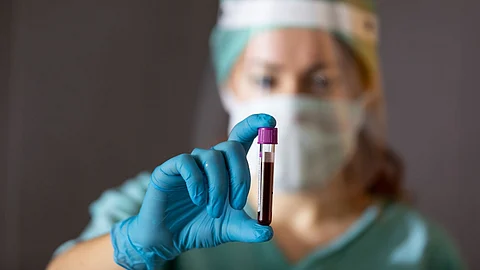

New Delhi: Plasma therapy, widely considered as most effective therapy to treat patients battling COVID-19 in India, has now been removed from the country’s clinical management guidelines on the outbreak.
On Monday, the Union Health Ministry along with the All India Institute of Medical Science, Indian Council of Medical Research-COVID-19 National Task Force (ICMR) took the decision as the procedure was found to be ineffective and declared revised guidelines. In the meeting, all members voted in favour of doing away with convalescent plasma therapy for COVID-19 treatment quoting its ineffectiveness and unsuitable use in many cases.
The decision to axe it from the guidelines comes against the backdrop of some clinicians and scientists writing to Principal Scientific Advisor K VijayRaghavan warning against the "irrational and non-scientific use" of convalescent plasma for COVID-19 in India.
In the letter, which was also marked to ICMR chief Balram Bhargava and AIIMS Director Randeep Guleria, public health professionals alleged that the current guidelines on plasma therapy are not based on existing evidence and pointed out some very early evidence that indicates a possible association between emergence of variants with “lower susceptibility to neutralising antibodies in immunosuppressed" people given plasma therapy.
WHY THE THERAPY WAS DROPPED
Taking the cognisance of the findings, Indian Council of Medical Research (ICMR) has reviewed the clinical guidance for management of adult patients of COVID-19 and dropped plasma therapy.
The ICMR took the decision after it ensured that the plasma therapy is not much beneficial. It was based on inspection of recovery trial documents and consideration of synthesis of global evidence which is not supporting the usage of plasma therapy.
The earlier guidelines permitted ‘off label’ use of plasma therapy at the stage of early moderate infection, that is, within seven days of the beginning of symptoms and if there is availability of a high titre donor plasma.
India had earlier shown the world's largest randomised controlled trials to study the efficacy of this therapy. The study, which came out in September 2020, resulted that plasma therapy failed to save people losing their lives amid the contagion.
Recently, British medical journal, Lancet published strong evidence reconfirming that plasma is not effective in reducing fatalities in COVID-19 hospitalisation. Those medical experts that continue to vouch for the potential efficiency of convalescent plasma therapy argue that it may only do so if undertaken at the earliest stages of the infection and not, as commonly witnessed around the country, as a last resort.
PLASMA THERAPY
In plasma therapy, antibodies from the blood of a patient who has recovered from the infection are used to treat severe patients. After China and the US, India had given nod for framing a protocol to conduct a clinical trial for plasma therapy. The therapy had been used experimentally in the past and so had become a ray of hope in the fight against the battle of coronavirus.
Several politicians, other eminent personalities have been helping people arrange plasma for their patients. Families of patients run round the clock for getting plasma, which is in short supply. The worry of patients and their families is understandable because they like to try the best for their family members, when a doctor has prescribed this, the public health professionals stated.
(With agency inputs)
